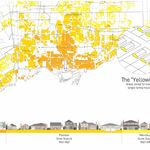steveintoronto
Superstar
https://www.toronto.ca/legdocs/mmis/2017/pw/bgrd/backgroundfile-106760.pdf
http://signaltoronto.com/funding-dockless-rental-bikes-toronto/Funding dockless rental bikes in Toronto
Sept. 21, 2017
By Laura Godfrey
The city’s Bike Share program grew again last month, adding 70 new docking stations to its existing 200 — a total of 2,750 Bike Share bikes in the city and 4,700 individual docks. While the transportation option is growing in availability, Councillor Mike Layton believes the city is running out of places to put those stations. This past week at the Public Works and Infrastructure Committee, he requested that city staff consider dockless bike sharing and report back on its feasibility in the fourth quarter of 2017.
But apparently staff are already on the case, with a plan to report at November’s Executive Committee meeting “to talk about bike share issues and a funding model, and this is part and parcel of that,” councillor and committee chair Jaye Robinson said. (Funding and the business of how the Toronto Parking Authority generates money was a hot issue at city hall in the spring, when city council was told of controversy arising from the value of the price of a parking lot.)
The committee moved to fold Layton’s request into the report.
The trend has already gained popularity in China, and this week, large-scale programs were launched in Washington, D.C., and Southampton, England. A small pilot project launched in Toronto this June from a Canadian company called Dropbike, with nearly 100 bikes in the downtown University of Toronto area, and it saw more than 5,000 rides during the first eight weeks. The technology allows users to unlock a bike using a smartphone app, ride for as little as $1 an hour, and then return it at any of the designated bike racks or parking spots, without the need for a large docking station.
In his letter to the committee, Layton, a longtime advocate for cycling infrastructure, praised the potential of Canadian company Dropbike — it’s the latest dockless bike-sharing company in Montreal, as reported by Kevin Mio in the Montreal Gazette. “According to Dropbike, the bike sharing industry is estimated to be worth $5.9 billion by 2020,” Layton wrote in his letter.
“Unfortunately, in a city as dense as Toronto, we are running out of sites big enough to accommodate the large docking systems currently required by Bike Share Toronto’s system,” Layton wrote. “The city will soon need to look for alternative methods if we want to continue to expand the system.”









